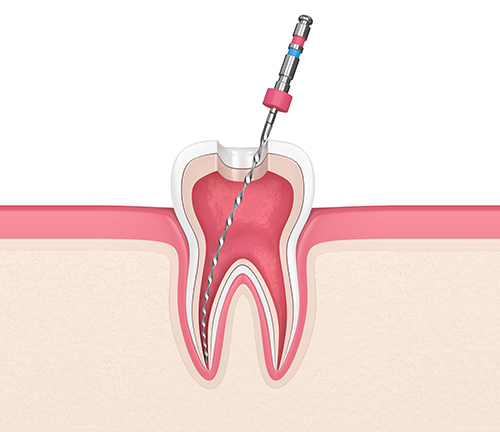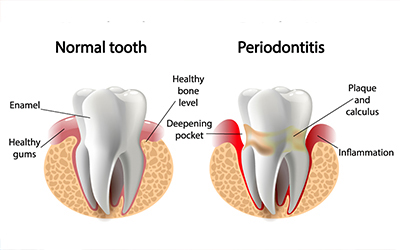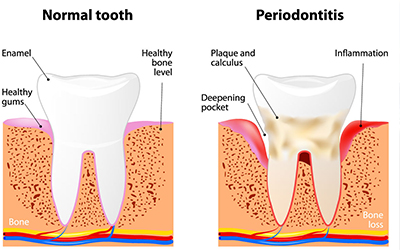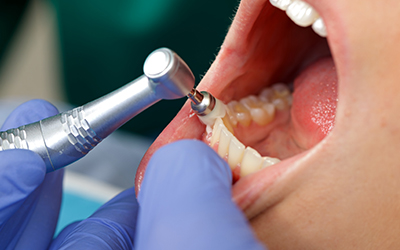 Root canal treatment is typically recommended when bacteria have infected the root of a tooth. In some cases, only minor discomfort might be felt from the infection. However, such an infection can cause an abscess with severe discomfort and/or pain, becoming a dental emergency. In addition, the long-term effects of the infected pulp can cause severe healthcare problems.
Root canal treatment is typically recommended when bacteria have infected the root of a tooth. In some cases, only minor discomfort might be felt from the infection. However, such an infection can cause an abscess with severe discomfort and/or pain, becoming a dental emergency. In addition, the long-term effects of the infected pulp can cause severe healthcare problems.
A root canal is designed to remove the infected pulp and bacteria from the root canals of a tooth. During this process, the area is cleaned and disinfected, which will help prevent reinfection of the tooth and save the natural tooth.
After a root canal, the tooth needs to be resealed. A dental crown is placed on top of the tooth using a permanent bonding material to seal the area and provide protection from further infection and decay.
Root Canal Treatment
Root canals have a poor rap in the dental industry as having the most pain and discomfort. However, there's no need to be worried. Many advancements in technology and the training of skilled dentists have allowed root canal therapies to be nearly pain-free. In fact, millions of teeth are treated and saved by root canals each year, relieving pain and making teeth healthy again.
Three layers of a tooth protect the interior soft tissue called the pulp. First, white enamel is on the outside of your tooth, followed by cementum and, lastly, dentin. The interior pulp contains blood vessels, nerves, and connective tissue, which help the development of your tooth while you are young.
When a breach or cavity has allowed bacteria to reach the pulp, the pulp can become infected, causing pain and discomfort. When this occurs, the tooth's pulp cannot be saved. However, a fully developed tooth can survive without the pulp as the tooth continues to be nourished by the tissues surrounding it. Therefore, the pulp is removed with a root canal to save the tooth.
A local anesthetic is often injected into the area to begin. Once the anesthetic has taken effect, our dentist will begin to remove the infected pulp and clean the canal. A post may be inserted for structure and support, as well as an antibiotic.
Lastly, the tooth is sealed with a new dental crown.
Reasons for a Root canal?
Root canals are often recommended for cracked teeth, tooth injuries, genetics, deep cavities, or issues from a previous dental filling. Patients generally will feel sensitive to hot and cold foods. In some cases, the infection will become quite painful. Below are a few more symptoms that may require a root canal:
- Severe pain while chewing or biting
- Abscess under the skin or in the jaw
- Pimples on the gums
- Signs of a chipped or cracked tooth
- Lingering sensitivity to hot or cold, even after the food has been removed
- Dark red, swollen, or tender gums
How Much Does a Root Canal Cost?
The cost of a root canal varies depending on the complexity and which tooth is affected. For example, teeth in the back of the jaw are more challenging to treat, increasing the cost of the procedure. Most dental insurance policies provide some coverage for root canal treatment. And Medicaid does provide some level of coverage for complex forms of dental care like root canals.
Find a dentist that accepts Medicaid near me.
In general, the treatment and restoration of your natural teeth are less expensive than the alternative. Dental implants or dental bridges are great replacement options that restore chewing function and prevent teeth from shifting where otherwise a tooth may be missing. However, these treatments tend to cost more than saving a tooth through a root canal treatment.
Articles
OUR Blog
Allow our family dentistry clinic to care for your oral healthcare needs with our comprehensive list of services, including dental crowns, dental restorations, teeth extractions, teeth cleaning & examination, teeth whitening, etc. In addition, we also offer essential dental care services such as dentures, partial dentures, veneers, and dental implants. Learn more about these dental services and trending oral healthcare topics in our monthly blog.











